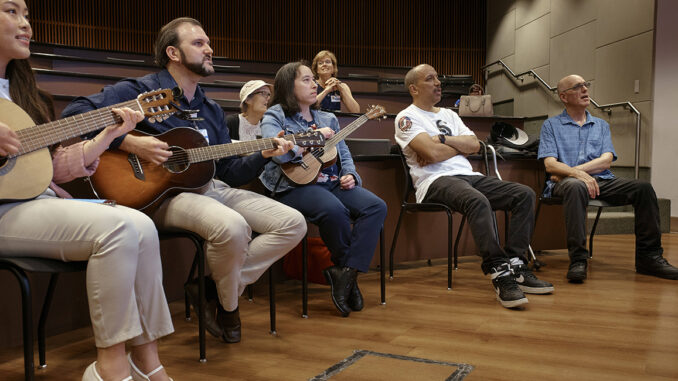
In the 1980s and ’90s, Ron Spitzer played bass and drums in rock bands — Tot Rocket and the Twins, Western Eyes and Band of Susans. He sang and wrote songs, toured the country and recorded albums. When the bands broke up, he continued to make music with friends.
But a stroke in 2009 put Spitzer in a wheelchair, partially paralyzing his left arm and leg. He gave away his drum kit. His bass sat untouched. His voice was a whisper.
Now, music is part of his healing. Spitzer sings weekly in a choir for people recovering from a stroke at the Louis Armstrong Center for Music and Medicine at Mount Sinai in New York.
“I’ve found my voice, quite literally,” Spitzer said.
Scientists are studying the potential benefits of music for people with dementia, traumatic brain injuries, Parkinson’s disease and stroke. Music lights up multiple brain regions, strengthening neural connections between areas that govern language, memories, emotions and movement.
And music seems to increase levels of a specific protein in the brain that’s important for making new connections between neurons, said Dr. Preeti Raghavan, a stroke rehabilitation expert at Johns Hopkins Medicine and volunteer for the American Stroke Association.
“It increases the possibility that the brain will rewire,” Raghavan said.
Choirs like the one at Mount Sinai offer the hope of healing through music while also providing camaraderie, a place where stroke survivors don’t have to explain their limitations.
“We’re all part of the same tribe,” Spitzer said.
Strokes often damage cells in the brain’s left-hemisphere language center, leaving survivors with difficulty retrieving words, a condition called aphasia. Yet the ability to sing fluently can remain, said Jessica Hariwijaya, a research fellow at Mount Sinai studying the stroke choir.
Singing can help stroke survivors improve their ability to speak. The National Aphasia Society maintains a list of music and arts programs, including choirs that meet online, for people with the condition.
Spitzer’s stroke damaged the right side of his brain, which some scientists identify as necessary for processing musical pitch patterns. He lost the ability to sing familiar music. Once, a Beatles song came on the radio, and he tried to sing along, but the tune was out of his mind. He called it an “out-of-body experience.”
“It was like, ‘This isn’t me,’” he said
Rigorous research is in its early days, with the National Institutes of Health supporting studies on how music works in the brain and how it might be used to treat symptoms of various conditions.
Raghavan said that that level of research will be necessary for health insurers to reimburse music therapy.
The Mount Sinai study will gauge how participation in the choir affects speech and mood. Researchers will compare 20 patients randomly assigned to choir therapy with 20 patients receiving standard care.
Now 68, Spitzer has completed other rehabilitation programs that helped him regain physical skills. He walks with a cane, can yell like any New Yorker and has recovered his singing voice.
“I attribute a good amount of this recovery to the stroke choir,” he said. “Just getting back to being able to sing a tune was very invigorating.”
